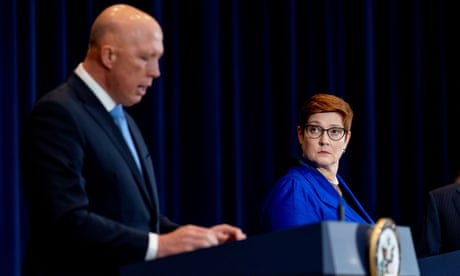- by foxnews
- 03 Apr 2025
Labor warns against ‘political captain’s call’ as Dutton’s choice to head defence thinktank delayed
Labor warns against ‘political captain’s call’ as Dutton’s choice to head defence thinktank delayed
- by theguardian
- 18 Mar 2022
- in news

The Australian government's planned appointment of the foreign affairs minister's chief of staff to the helm of an influential policy thinktank is yet to be approved, amid speculation the official was not the preferred candidate.
The delay in appointing Marise Payne's top adviser, Justin Bassi, to lead the government-funded Australian Strategic Policy Institute has prompted Labor to warn against "a political captain's call" on the eve of the election.
The Australian reported in December that Bassi, a foreign policy hawk who also previously advised Malcolm Turnbull, was "set to be named" as head of ASPI. It reported the defence minister, Peter Dutton, had recommended the appointment to Scott Morrison's cabinet.
However, Guardian Australia understands Bassi was not the preferred candidate of all of the members of the ASPI council, and that there have been ongoing discussions between the chair, former army chief Kenneth Gillespie and Dutton's office on the matter.
A Defence spokesperson confirmed the appointment process was not yet finalised.
Dutton's office responded with a similar comment. Neither Dutton's office nor Defence answered direct questions about whether the government would make an appointment that is consistent with advice from ASPI or the department.
They also did not explain why it was taking so long to formalise the replacement for the incumbent executive director, Peter Jennings, who is due to finish up next month.
Labor's defence spokesperson, Brendan O'Connor, called on the government to rule out a pre-election political decision.
"There is no greater responsibility than the security of our nation, and part of that is restoring the integrity, trust and transparency of our institutions," O'Connor said.
O'Connor submitted freedom of information applications to both the department and to Dutton's office in late December seeking all documents related to the selection of the new executive director, including correspondence with ASPI. Both decisions are overdue.
"Considering the appointment for ASPI's CEO is imminent and we are on the eve of an election, the defence minister has an obligation to respond to the FOI request and demonstrate that a candidate recommended by an apolitical body has not been overlooked in favour of a political captain's call," O'Connor said.
Government insiders are acting on the assumption that Bassi will be formally appointed, although he may stay in Payne's office until the election, due in May.
The ASPI council had set up a subcommittee to oversee the selection process in conjunction with a recruitment firm. Several internal contenders had been in the running.
In a field of potential candidates to lead the organisation, Bassi had been assessed as suitable for the position, but the preferred candidate is said to be Michael Shoebridge, currently a director of the thinktank's defence, strategy and national security program.
While previous media reports had said the decision would have to go to cabinet, the ASPI constitution is not as definitive, saying the organisation's directors may appoint a person to the top position "in consultation with the minister" and on terms "as the directors see fit".
The Howard government created ASPI in 2001 to "provide alternative sources of input to government decision-making processes" and to "nourish public debate and understanding".
But it stressed at the time that the organisation should operate independently of government, with ministers believing "the perception as well as the reality of that independence would need to be carefully maintained".
According to the Howard government's charter letter, ASPI should also "take steps to avoid becoming identified with any narrowly defined lines of thought on specific issues, and attention should be paid to publishing a range of views on contentious topics".
In recent years, ASPI has taken on a prominent role in public debate about how Australia should position itself relative to a more assertive China, and Jennings has been a prominent voice calling for a Chinese company to be stripped of the long-term lease over the Port of Darwin.
The organisation has attracted the ire of Beijing, particularly for its research documenting human rights abuses in Xinjiang. The now-infamous list of grievances issued by the Chinese embassy in 2020 included criticism of the Australian government for funding what it called an "anti-China thinktank".
More than half of ASPI's funding comes from either the Department of Defence or other federal government agencies. Defence has earmarked $20m in total funding for the period 2018 to 2023. Last year the government poured in an extra $5m to allow ASPI to set up another office in Washington DC.
A portion of ASPI's funding also comes from defence contractors. The organisation has always insisted that it is transparent about its funding but it "remains independent in the content of our research and in all editorial judgements".
Bassi, who also previously held a senior role at the Office of National Intelligence, is credited with driving the government's increasingly firm policies on foreign influence and interference and cybersecurity.
Payne's office was contacted to offer Bassi an opportunity to comment.
- by foxnews
- descember 09, 2016
Flight passenger says man deliberately squatted in window seat, ignites social media debate
An airline flyer said a seat squatter tried to tell her to swap seats with him, but she stood her ground, prompting a social media debate. A travel expert weighs in.
read more


